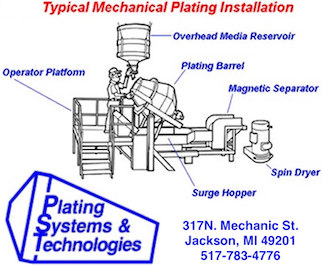
Curated with aloha by
Ted Mooney, P.E. RET

The authoritative public forum
for Metal Finishing 1989-2025

-----
Rusty yellowish surface after pickling
Q. Hello,
We are facing issue related to rust spots appearing on pickled coil after a few days in ambient temperature.
Can you please suggest how we can get rid of such defect?
employee - karachi, sindh, Pakistan
August 28, 2023
⇩ Related postings, oldest first ⇩
Q. Hi there. First of all, thanks to this site for giving me an opportunity to talk about our problems. We are trying to pickle sandblasted and/or hot rolled coils in our laboratory to see if we can achieve or not.
Our coils are St37 quality and chemical composition is
C: 0.05 - 0.15
Si: 0.01 - 0.04
Mn: 0.50 - 1.40
P: 0.015 - 0.045
S: 0.015 - 0.045 (these are nearby numbers)
we made a 18% HCl concentrated solution at temperature 80 °C and the system has stirring for homogenization of heat and iron concentration in the solution. We pickled our samples successfully (great surface cleaning) but after we rinsed them with tap water (nearly 60-70 °C) surface of the samples started to get yellowish color. And after rinsing we dried the samples with compressed air (temperature of the compressed air is room temperature). I am wondering why this happened and how we can get rid of this yellowish surface. And also is there a way that we can determine the saturation of the iron in the solution? if there is, I would be glad to know about it.
Thank you for your attention.
Kocaeli, TURKEY
2006
A. Suggestions:
Add an inhibitor to the HCl solution (leaves a protective film on the bare metal).
Lower the temperatures of the HCl & rinse to ambient (and add a hot RO or DI water rinse, to aid drying).
Add a corrosion inhibitor to the rinse.
Maintain a pH of 8-9 in the rinse using approximately 0.3 wt% sodium carbonate or sodium triphosphate.
Any inhibitor should be compatible with subsequent procedures.
See also thread 39958.
Also, do searches for "flash rust" and "pickling" on finishing.com
- Goleta, California
Rest in peace, Ken. Thank you for your hard work which the finishing world, and we at finishing.com, continue to benefit from.
Flash Rust Problem after using Hydrochloric Acid
Q. Hello, I am using Hydrochloric Acid to remove Mill Scale from Mild Steel Sheet 2mm & 3mm.
When I remove the part from Hydrochloric Acid Bath, I immediately rinse off using cold tap water, then I place part in front of a space heater to dry off properly.
My problem is that "flash rust" appears almost as soon as the metal is dry :-(
Can anyone please suggest a way to stop this "Flash Rust" happening?
I am in Scotland, so not always the warmest place on the planet! ;-)
Thanks in advance
Regards,
Dundee, Angus, Scotland
February 17, 2015
A. Hi Dunk. Ken has offered some helpful hints, but it's important to understand that for parts to flash rust after an HCl dip is the natural order of things, not some strange temporary quirk that we must resolve.
At the least, the parts should be in an alkaline state before drying, via a dip in an alkaline cleaner and rinsing after the HCl dip and its rinse. But preferably the parts should receive some sort of rust preventative treatment. Good luck.
Regards,

Ted Mooney, P.E.
Striving to live Aloha
finishing.com - Pine Beach, New Jersey
|
Q. Hi Ted, Thanks for your reply, I wonder if you could help clarify some of the points I have read? Dundee, Angus, Scotland A. Hi Dunk, Aerospace - Yeovil, Somerset, UK |
A. Hi again. Brian's reply crossed in the mail with your request for clarification, and may provide the best answer and pre-empt some other questions.
0.3 wt% means 3 parts per thousand by weight, i.e., 3 grams of sodium carbonate per kilogram of water, i.e., about 3 grams per liter.
There are many corrosion inhibitors, but metal finishing is a well developed industry, and for additives to pickling acid you should inquire of a supplier/distributor to the finishing industry rather than to a boiler supply house; for one thing there might be certain incompatibilities between pickling and a given corrosion inhibitor.
By "rust preventative treatment", I was referring to a temporary rust preventative material like Brian describes rather than a final powder coated finish. But if you can proceed directly from pickling to phosphatizing (the pretreatment for powder coating) that would be fine too; but people often can't do that because, for example, you may need to do machining after pickling but before powder coating.
Regards,

Ted Mooney, P.E.
Striving to live Aloha
finishing.com - Pine Beach, New Jersey
A. There are several possible causes. For one, you did not mention the pH or the chloride concentration . To avoid flash rusting the chloride concentration should be below 5 mg/L. Some companies also add a citrate-based corrorion inhibitor to the final rinse.
Lyle Kirmanconsultant - Cleveland Heights, Ohio
![]() Hello Brian, Ted & Lyle, Thank you for your replies, I will go and do some "experimenting" and see how I get on.
Hello Brian, Ted & Lyle, Thank you for your replies, I will go and do some "experimenting" and see how I get on.
I really appreciate your help
Cheers
Dunk
Dundee, Angus, Scotland
Q. Hello Brian,
Thanks for your suggestion, but I don't think it would work for me, as I intend to powder coat items within 30 minutes of being dried off.
And would adding your suggestion of immersing in de-watering oil, not add a need to degrease & dry the said item prior to powder coating.
Or if you know of a dewatering oil, that dries off, and allows powder coating on top, that would be an ideal solution :-)
I have read about people who claim not to have a problem with flash rusting following a bath in Hydrochloric Acid, I think they were in California (a hot place I imagine) ;-)
With Scotland not being the warmest of places, Like my Workshop!
How does the idea of "Drying Items in an oven" after the final rinse sound? Or would they simply Flash Rust as soon as I take them out of the oven?
Thanks again for all your suggestions
Regards
Dunk
Dundee, Angus, Scotland
A. The main issue tends to be that if your mild steel flash rusts, you are not getting it dry enough quickly enough.
Assuming the ambient humidity is low enough to not be an issue, whatever method you chose to get that water off there as fast as possible should be fine.
An oven sounds good. You could also douse it in some kind of solvent (acetone, rubbing alcohol, etc.) that will drive the water away and then itself evaporate quickly.
An "RP" (temporary protective coating) usually comes into play when the ambient humidity is high enough to be a problem if the steel is going to be left sitting out for a while.

Ray Kremer
Stellar Solutions, Inc.
McHenry, Illinois

Q. Hi Folks, I am getting there, a lot better results now that I am dipping in a sodium carbonate
⇦ this on
eBay or
Amazon]
/ Water Mix :-)
Following on from previous suggestions about using an inhibitor, I actually have a proper inhibitor in my workshop that I use in my water tray on my CNC Plasma System!
It is supplied by my CNC Table Supplier and is called Plasma Anti-Rust 2309
The Material Safety Data Sheet states that its composition is:
DISODIUM TETRABORATE DECAHYDRATE 1-5% CAS-No: 1303-96-4 EC N0: 215-540-4
SODIUM MOLYBDATE 1-5% CAS No: 7631-95-0
BENZOTRIAZOLE 1-5% CAS No: 95-15-7
I wonder if anyone who frequents finishing.com has the EXPERT Knowledge to tell me if this product is suitable for use as an inhibitor in either my HCI Dip or my Sodium Carbonate Dip?
Thanks in advance
Regards
Dundee, Angus, Scotland
How to prevent rusting after acid pickling
Q. I am doing internship in industry where acid pickling is done to descale and de-rust the iron bars.
But bars get rusted again if let in open space for couple of days..
What can be done to prevent re-rusting of iron bars after pickling?
Punjab, India
March 19, 2017
A. Here's what many electroplaters do when faced with the same issue: After pickling, they dip the articles in the rinse water from their alkaline cleaner and dry without rinsing. Steel corrodes very, very slowly in an alkaline environment and the small amount of alkali on the surface of the part neutralizes airborne acid fumes. Of course, if you have a lot of acid fumes in the air, they will win the battle.

Tom Rochester
CTO - Jackson, Michigan, USA
Plating Systems & Technologies, Inc.

|
Q. Thanks for the reply; I want to know... Punjab, India A. Anmolpreet,  Ray Kremer Stellar Solutions, Inc. McHenry, Illinois  |
Q, A, or Comment on THIS thread -or- Start a NEW Thread